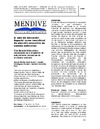Please use this identifier to cite or link to this item:
https://accedacris.ulpgc.es/jspui/handle/10553/55648
| Title: | El aula de Educación Especial como modalidad de atención educativa en centros educativos ordinarios | Other Titles: | The special education classroom as a modality of educational attention in ordinary centers | Authors: | Artiles Rodríguez, Josué Rodríguez Pulido, Josefa Bolaños Paz, Gemma |
UNESCO Clasification: | 58 Pedagogía | Keywords: | Aula de Educación Especial Inclusión educativa Modalidad de escolarización Discapacidad intelectual Interacción entre pares, et al |
Issue Date: | 2018 | Journal: | Mendive | Abstract: | El aula de Educación Especial, en un centro ordinario, es una modalidad de escolarización destinada a un número reducido de alumnos con discapacidad, que pasa la mayor parte del tiempo en ella y que puede compartir recreos y otras actividades con el resto del alumnado del centro. El objetivo de este artículo se centra en caracterizar esta modalidad de escolarización y determinar qué aspectos de la literatura señalan factores que facilitan o limitan el funcionamiento de estas aulas. La metodología se llevó a cabo mediante búsqueda booleana para realizar una revisión bibliográfica de diversos países que se enmarcan en este modelo como Chipre, Grecia, Islandia, Portugal y España. Además, dentro de España se analiza esta modalidad en las Comunidades Autónomas. Una vez revisados los resultados obtenidos, aunque es una modalidad que ha venido a sustituir al centro de Educación Especial , no se ha producido un cambio evidente en la atención de su alumnado. A pesar del aumento de estas unidades no se ha producido un incremento de la investigación sobre ellas, siendo una de las limitaciones los pocos estudios realizados. Esto evidencia la necesidad de ampliar las líneas de investigación sobre estas aulas para mejorar la inclusión de su alumnado con discapacidad. The special education classroom in the ordinary center is a form of schooling aimed at a small number of students with disabilities, who spend most of their time in it, who can share recesses and other activities with the rest of the school's students. The objective of this article is to characterize this type of schooling and determine which aspects of the literature indicate the factors that facilitate or limit the functioning of these classrooms. The methodology was carried out by Boolean search to carry out a literature review of several countries that are found in this model such as Cyprus, Greece, Iceland, Portugal and Spain. In addition, within Spain this modality is analyzed in the Autonomous Communities. Once the results have been reviewed, although it is a modality that has come to the special education center, there has not been an evident change in the attention of its students. Despite the increase in these units, there has not been an increase in research on them, being one of the limitations of the few studies carried out. This evidences the need to expand the lines of research on these lines to improve the inclusion of their students with disabilities. |
URI: | https://accedacris.ulpgc.es/handle/10553/55648 | ISSN: | 1815-7696 | Source: | Mendive [ISSN 1815-7696], v. 16 (4), p. 651-664 | URL: | http://dialnet.unirioja.es/servlet/articulo?codigo=6622584 |
| Appears in Collections: | Artículos |
Page view(s)
51
checked on Apr 20, 2024
Download(s)
208
checked on Apr 20, 2024
Google ScholarTM
Check
Share
Export metadata
Items in accedaCRIS are protected by copyright, with all rights reserved, unless otherwise indicated.
